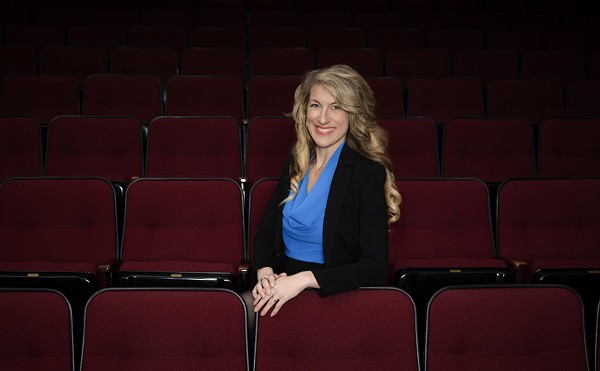As Lilly, the self-proclaimed Queen of Everything, Chrissy Brooks is all elbows and sparkling eyes — a whirlwind of emotions that cuts across the stage taking no prisoners. Covered in colorful Band-Aids and always carrying a water pistol and a costume, Lilly is ready for anything life throws in her path...except for a new Baby Brother. Lilly's struggles with jealousy and feelings of displacement form the main part of the show's action, and Brooks presents each new feeling with delightful honesty.
While Lilly is the title character, she is nicely balanced by the antics of Wilson and Chester. These buddies are "two peas in a pod" — or more accurately, two pens in a pocket protector. These nebbishes are hilariously brought to life by Christopher Manelli and Robert Thibaut, whose outstanding bits of physical comedy — bike rides with synchronized hand signals, dances, a tennis game — evoke laughter from audience members of all ages.
The solid cast also features Erica C. Sutherlin as Lilly's Mother and Eddie Webb as the schoolteacher Mr. Slinger; both imbue their storybook characters with invigorating charm. Their positive interactions with Lilly are nicely contrasted by Michele Dumoulin's precisely prissy work as the perpetually perfect Cousin Garland. A group of nine local middle- and high-school students rounds out the pleasantly diverse ensemble — they move scenery, play a variety of characters and add a real feeling of joy to the production. Ideally the younger actors will continue to work on their volume levels, so all of their lines can be heard and appreciated.
Kling's montage strategy results in an episodic play that features many short scenes and multiple locations — sometimes it feels more like a television or movie script than a play. Nicholas Kryah designed a colorful multipurpose set that shifts quickly from school to home to outdoors, and the cast handles the scene shifts efficiently. But every time the action stops for a scene shift, the audience gets restless. While the pattern of interrupted storytelling is certainly familiar to everyone who watches commercial TV, here the stop-and-start flow makes it difficult for an audience to remain engaged.
In addition, the dialogue too often sounds like people quoting lines from books, which makes many of the scenes seem stilted. It's as if Kling couldn't decide whether to make his characters' interactions sound like real-life conversation or heightened "storybook" language. Instead he wavers between the two, trapping the actors in a world of words that detract from their otherwise engaging performances.
Within the individual scenes, director Emily Petkewich keeps the action moving well. Lilly's fantasy sequences have nice momentum and build to appropriately grand climaxes, while moments of genuine sadness and frustration are played with quieter intensity. Petkewich allows the audience to partner with her ensemble, providing room to use one's imagination, for example, in a scene during which Chester and Wilson ride bikes and are hassled by a group of "big kids."
Billed as a show for children age four and up, Lilly's Purple Plastic Purse may be more appreciated by students nearing middle school — they'll understand some of the more subtle humor and recognize Lilly's valid emotions. The younger ones will enjoy the production, but this sometimes silly, sometimes serious reflection on the challenges of being very young may ultimately be most appreciated by those who no longer are.





